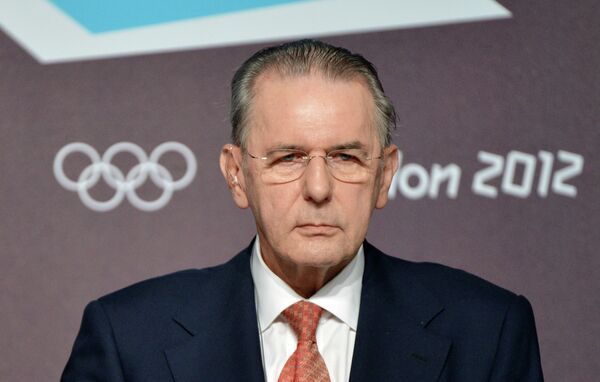The London Olympics have been proclaimed as the best Games ever by IOC president Jacques Rogge.
That may sound impressive, but in reality it's a hollow accolade; bestowed upon any Olympics that manage to avoid the organizational calamity of Athens 2004 or Atlanta 1996.
This year, however, Rogge went a step further, saying London reminded fans why they love sport in the first place.
"London promised an athletes' Games, and that's exactly what we got," said Rogge, presiding over his last of six Olympics as IOC chief.
"I am a very grateful and happy man. We are very happy with the Games."
It was indeed the performances of the athletes that dominated attention during the Games, and amid the sea of record-setters it was two men who stole the limelight.
U.S. swimmer Michael Phelps hung up his cap after becoming history's most decorated Olympian.
The Baltimore Bullet won four gold and two silver to take his career tally to a record 22 medals, four more than legendary Soviet gymnast Larisa Latynina, helping the U.S. to a huge gold tally of 16 in the pool.
On the track, Jamaica's Usain Bolt put to bed any debate about his status as history's greatest sprinter.
Bolt became the first person to retain all three sprint titles with his breathtaking victories in the 100 meters, 200 meters and 4x100 meter relay.
The only individual sprint gold his country failed to take was the women's 200 meters, won by Allyson Felix of the United States.
In cycling, Chris Hoy won his fifth and sixth Olympic golds to overtake rower Steve Redgrave as Britain's most decorated Olympian. Bradley Wiggins added a time trial gold to the team pursuit and individual pursuit gold he took in Beijing and Athens.
The home nation, which enjoyed its best Olympic performance in 104 years, also enjoyed an outstanding first night of track and field.
Jessica Ennis won the heptathlon, Greg Rutherford the long jump, and Mo Farah the 10,000 meters in the space of two hours. Farah would go on to win the 5,000 meters for a famous long-distance double.
Andy Murray's tennis gold medal after thrashing Roger Federer in the final further spread the feel-good factor.
The Chinese ramped up their incredible dominance in the table tennis and the scandal-hit badminton, sweeping the golds in both sports.
Eight badminton players including China's No. 1 seeds were removed from the women's doubles event for trying to lose their final group stage matches in order to get a more favorable draw in the knockout phase.
China's 16-year-old swimmer Ye Shiwen was arguably the brightest Olympic breakthrough, taking nearly a second off the 400 meters individual medley world record in her second major competition.
The time was so fast she was forced to deny accusations of foul play made by U.S. swimming officials.
Another outstanding find was fifteen-year-old Lithuanian swimmer Ruta Meilutyte, who took a surprise Olympic gold medal in the 100 meters breaststroke, her first competitive final.
In athletics, 19-year-old Keshorn Walcott of Trinidad and Tobago shot out of obscurity to win men's javelin gold with the biggest competitive throw of his life.
The Games had their share of other stick-in-the-mind moments, chief among them the teary protest of South Korean fencer Shin A-Lam.
Shin lost her individual epee semifinal to Britta Heidemann of Germany in controversial circumstances after timing error and sat dejected on the strip for over an hour before her coaches' protests were rebuffed.
There was the longest match ever seen in Olympic tennis when Roger Federer toiled past Juan Martin del Potro of Argentina 3-6, 7-6(5), 19-17.
And few at the Eton Dorney rowing venue will forget the exploits of Niger's Hamadou Djibo, who got in boat for the first time just four months before the competition.
Djibo finished last in his single sculls heat, a minute and a half down on the winner.
The now-perennial U.S.-versus-China medal table narrative took a twist with the Chinese disappointing slightly and the Americans reversing the result of Beijing in 2008.
The U.S. took home 46 gold, 106 total medals, with China eight short in gold and 17 adrift in all.
Russia came strong toward the end to net 24 golds, but fourth place in the medal table is its lowest finish in post-Soviet history.
That is a point of concern in a country looking to be world beaters on home soil at the 2014 Sochi Winter Olympics.
Saudi Arabia sent female athletes to the Games for the first time, with Sarah Attar running the 800 meters and Wojdan Shaherkani competing in judo.
These Games, meanwhile, were inevitably hit by a handful of doping expulsions ranging from drug cheats to pot smokers.
Among them were American race walker Alex Schwazer; Moroccan 1,500 meters runner Amine Laalou; Russian cyclist Victoria Baranova; Uzbek gymnast Luiza Galiulina; and Albanian weightlifter Hysen Pulaku.
St. Kitts and Nevis sent home sprinter Tameka Williams for taking a substance that they feared "would fall outside the accepted medical code."
American judoka Nicholas Delpopolo was disqualified after testing positive for cannabis.
There were minor issues with filling seats, too, as organizers were forced to give away tickets to high-demand events such as the 100 meters final; that despite ticketing websites claiming sellouts.
But for many the most enduring impression of the Games will be the spirit in which they were conducted.
Bolt was the highest-profile gentleman, refusing to disturb an American medal ceremony for a television interview.
At the velodrome, cyclist Victoria Pendleton embraced the fierce rival who had just beaten her to the gold, Australia's Anna Meares.
The good will that trickled down through the athletes, staff and especially the 70,000 volunteers.
"Everywhere I go, no matter what optic I see these Games through and who I speak to, they are the people who are being spoken about," said chief organizer Sebastian Coe.
"It has been an extraordinary fortnight; just amazing, amazing scenes."
The closing ceremony is set for later Sunday.

